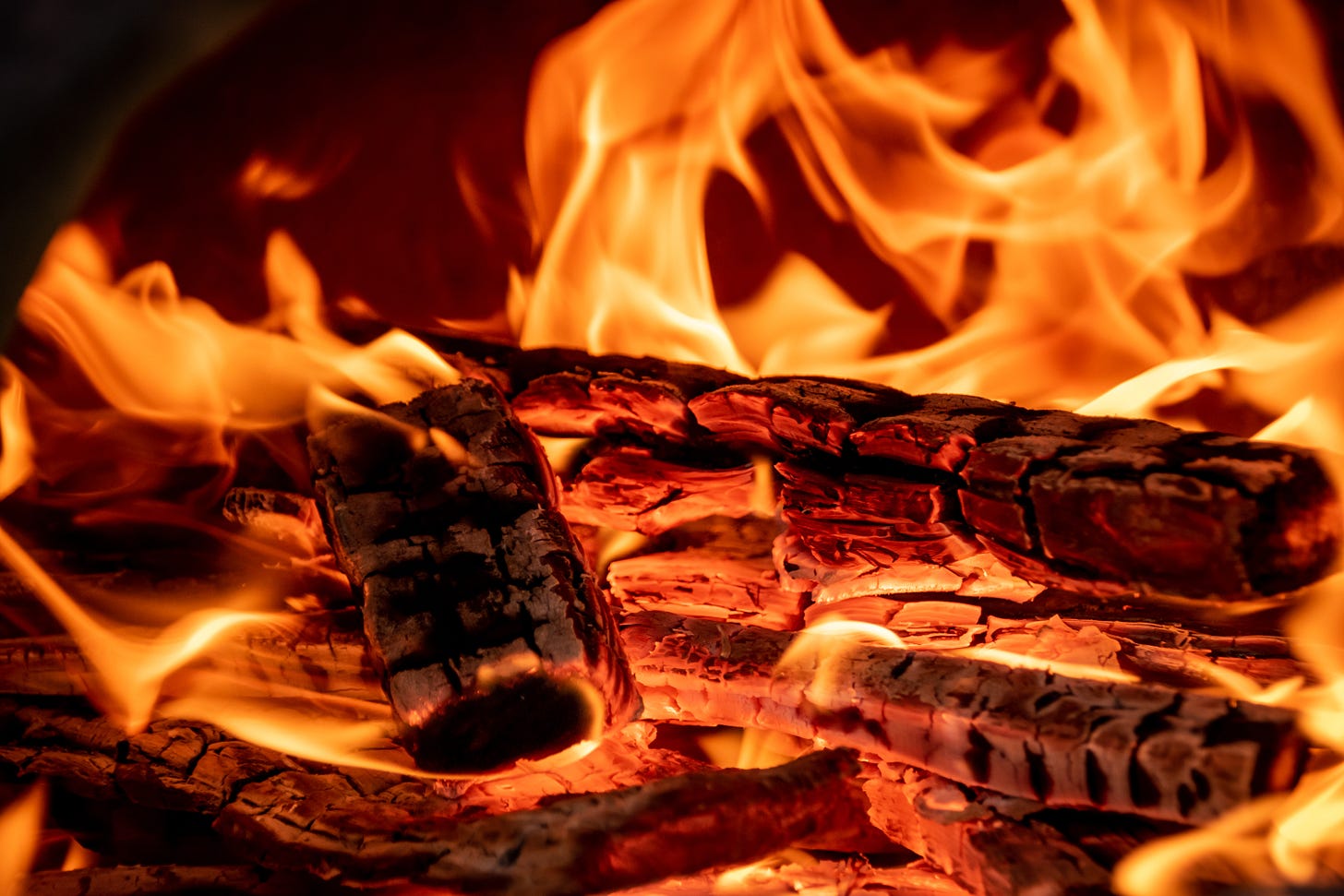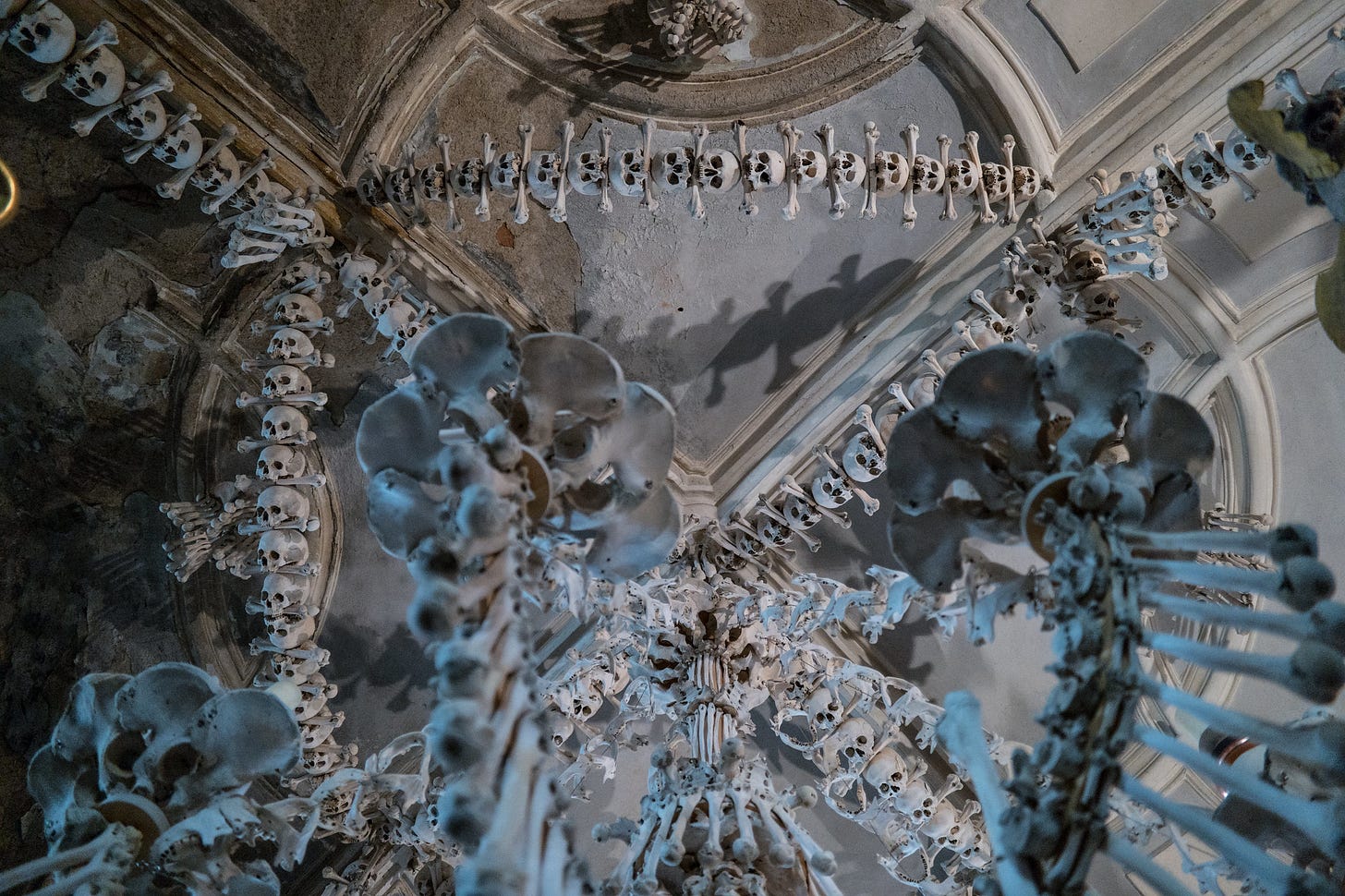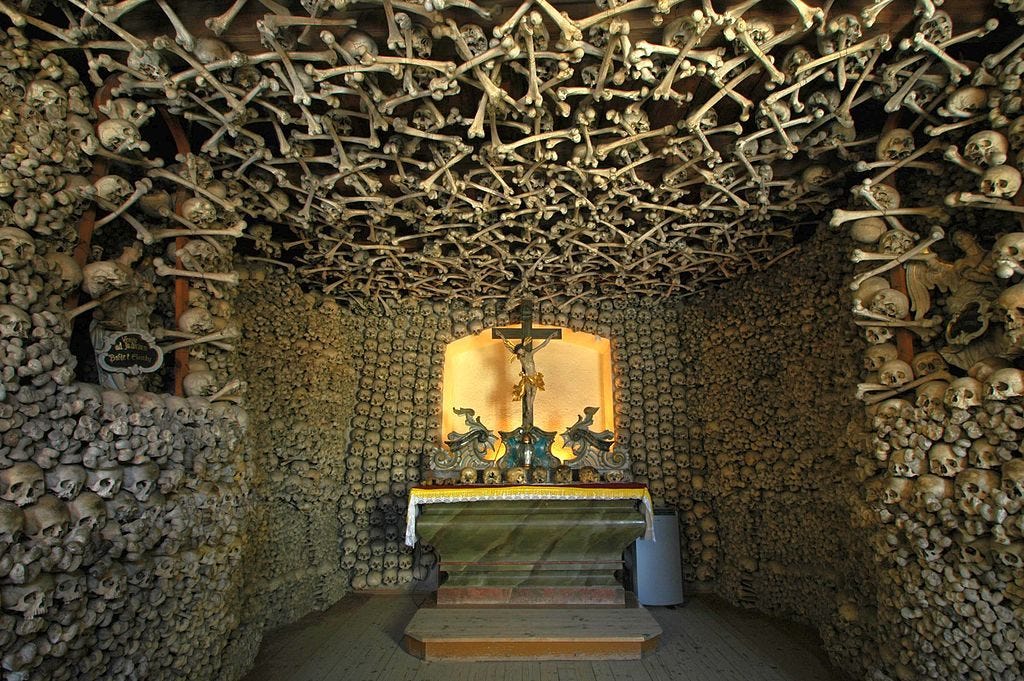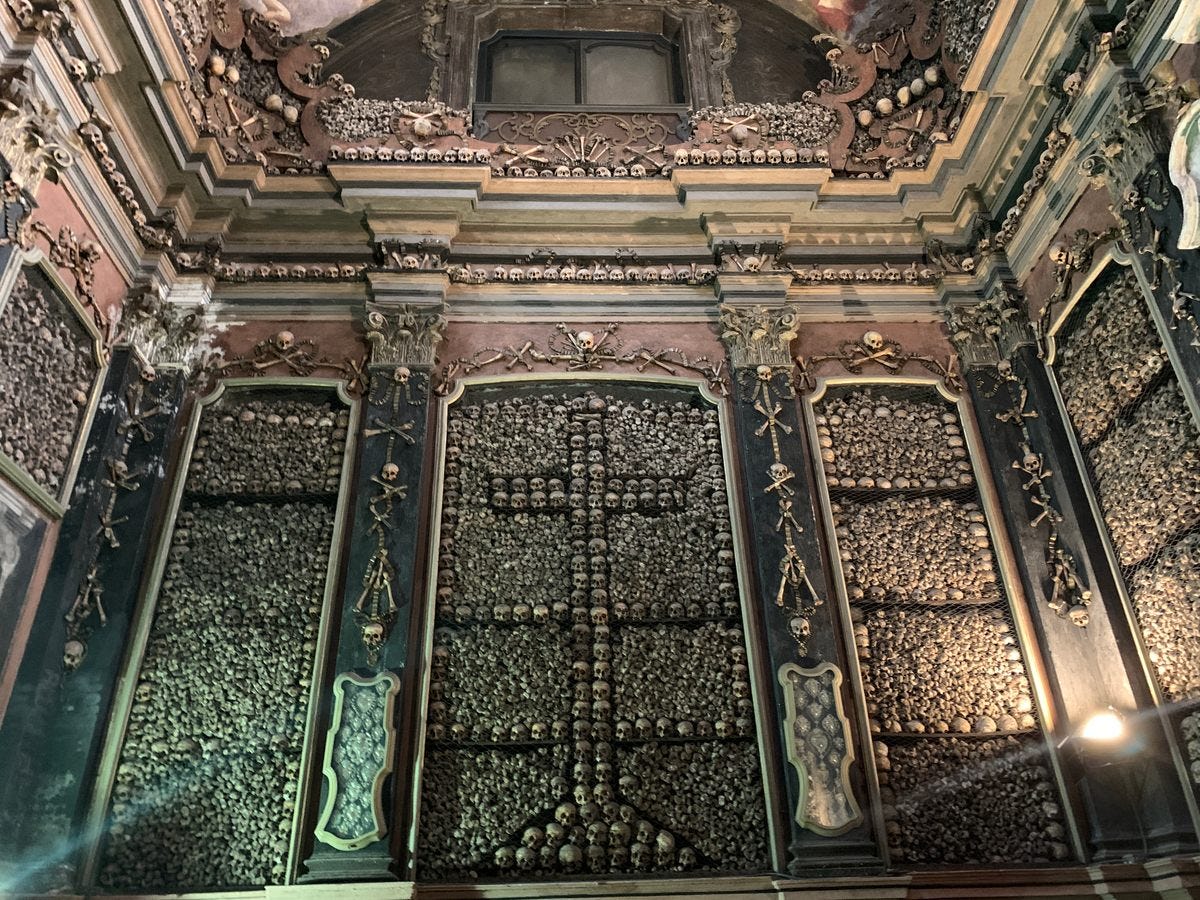The Forests of the Dead
How a violent 1600-year old political and religious struggle over the fate of the dead is finally beginning to end.
It was last year that I first visited a forest of the dead. A light rain fell as we walked, our boots caking with clay from the wet soil beneath our feet. It was a solemn procession; few spoke except to greet each new arrival with a quiet “hello,” nodding sadly, offering embraces.
The path into the forest was broad, a well-worn trail tread by many others, leaf-strewn from the autumning of the trees above us. Twigs and acorns snapped gently under our weight; more fell in the strong but not unkind gales of wind sweeping through the old and tall beeches and oaks.
It felt the forest knew we were there. Not just in the way plants and mycella signal each other in reaction to animal proximity, but an almost human recognition the people gathered there seemed to recognize.
We had arrived to the forest of the dead for a funeral. Along with a few hundred others, we had come to say good-bye to a well-loved woman cut down early from life, and her wishes were to sent back to the earth in a Bëschkierfech.
In the language here, Bëschkierfech means “forest cemetery.” In these forests of the dead, the ashes of those who’ve passed on are brought to the base of a pre-assigned tree, around whose towering trunk the ashes are then spread. Upon these trees is a small sign nailed carefully and unharmfully into its outer bark declaring whose ashes rest there.
In contrast to the church cemeteries and the mausoleums in this country, the signs are all the same size, with nobody’s name listed more prominently than another’s. There are no other memorials allowed in these forests, no headstones or statues, and most obviously missing of all: no crosses. No signs of Christian or any other religion mark these forests, though of course they have a deeply pagan feel.
That pagan sense can lead these forests to appear quite ancient, as if people have always been buried here. Adding to this sense is the Catholic and Orthodox opposition to these forests throughout Europe as clearly “pagan.” However: these forests are actually quite new, though the practice of spreading ashes of the dead is itself very ancient.
The very first Bëschkierfech in Luxembourg was founded in 2010. Luxembourg was one of the first countries in Europe to even allow the practice. France, for example, only established its first forest cemetery in 2020. Germany’s first Friedwald was founded five years before Luxembourg’s, though there are some significant differences between the two forms and what is actually allowed to happen with the ashes in those forests.
What can be done with the ashes of the dead, and even whether or not the dead may be burned, is still a very difficult matter throughout Europe. Many countries only recently began to allow cremation again, despite it being a core funeral practice to indigenous peoples in Europe for many thousands of years. In fact, these forests of the dead are a sign that a violent 1600-year old political and religious struggle over the fate of the dead is finally beginning to end.
The burning of bodies after death is a very widespread and ancient practice. The oldest surviving relics of indigenous European peoples, for example, are typically clay, stone, and later bronze urns for ashes. The preponderance of these countless urns is why the common name for the people which preceded and later became the Celts in Europe is the “Urnfield culture.”
Cremation was also a majority funeral practice among ancient peoples across the world, with one of the oldest discovered proofs of cremations occurring in Australia 25,000 years ago. Burials of intact corpses were much rarer, and were practiced primarily in what is now China and North America. Another method of corpse burial, which was common among the ancient peoples of South America, involved dismemberment, or stripping the flesh of corpses before or as part of burial. These practices include the well-known practice of “sky burial,” in which birds clean the flesh from the skeleton. A small minority of cultures used yet another method, preserving the corpse through mummification or desiccation (as in Egypt and the Andes).
What cultures do with people after their death has much more to do with beliefs about afterlife than matters of practicality. Those who believe in some form of re-incarnation (such as Hindus, and most animist peoples throughout the world) often burn the bodies in order to speed on the procession from one body to the next. The Greeks, in particular, formalized the belief that the spirit of a body was composed of air, and thus burning the body helped release that spirit. Sky burials, such as those practiced in Tibet, in the Andes, in some parts of Australia, and within Zorastrianism, are rooted in a similar belief. In such burials, the body is left in high places or on stilts to be picked apart by birds. The faster a body decomposes through the help of birds and insects, the sooner the spirit is released into the world.
“Western” burial traditions, however, are rooted in a different belief about the afterlife. Hebrew monotheism, Orthodox and Catholic Christianity, and Islam all hold that their supposedly solitary god will eventually resurrect the body in its “ideal” form. Despite the purported omnipotence of that god, however, a common belief for centuries was that he needed the body to be buried as intact as possible, lest there be parts missing later. For an example of how seriously this belief is still taken by some, an orthodox Jewish organisation in Israel, Zaka, tasks itself with scraping up and re-assembling the bodies of those who died in explosions, so that as much of the body can receive funeral blessings as possible.
Previous to the colonization of European peoples by Christianity, the burning of the dead was the most common funerary practice among the indigenous peoples of Europe. It was so widespread and so deeply ingrained that the conquering Christian religious order was only able to eradicate it through force.
Cremation in Europe was for many centuries considered a crime worthy of execution. One of the Emperor Constantine’s first decrees after conversion to Christianity was to outlaw it and all other pagan burial practices throughout the Empire. In 789, hundreds of years after Rome’s fall, the Christian Emperor Charlemagne, guided by the bishops and cardinals of the Church, decreed any who burned the remains of their loved ones should be put to death. Patriarchs and Popes both re-iterated the Christian doctrine that bodies must be buried whole, condemning the burned dead to hell and those who burned their remains to death or excommunication (which was often the same thing).
Perversely, cremation was regardless still allowed within Christian (both Catholic and Orthodox) lands if the person was a heretic, witch, or apostate. In such cases, the body could be reduced to ashes, provided the person was burned alive. In later cases, Christian authorities actually exhumed the bodies of apostates in order to burn them as punishment for the heretical ideas during life, as occurred to John Wycliffe. And occasionally, Christians would make exceptions in the cases of mass death from plague or war, when there were just too many bodies to be buried.
Orthodox Christianity and Islam both still maintain that cremation is an unclean or pagan practice and deny funeral rites and even prayers for those who willingly choose to become ashes after death. In Europe, it wasn’t until Vatican II (1963) that the Catholic Church began to allow for the cremation of bodies, but only under specific circumstances and with tight control over what occurs to the ashes afterward. For instance, ashes can be buried in graveyards or held in urns on church grounds, but they cannot be scattered to the wind, sea, or earth, nor can they be kept in shrines at home. In addition, if the cremation is done in any way that appears to “deny” the doctrine of bodily resurrection, no prayers can be said for the person after they have died.
Monotheism’s peculiar desire to control what occurs to the dead after they’ve died has deeper theological roots than merely the matter of bodily resurrection. European animist peoples often venerated their ancestors long after they had passed on, a practice still seen in indigenous cultures throughout the world and in formal animist religions such as Shinto. Pagan shrines in Europe often held the bones of the dead (after cremation) just as Catholic churches do: such shrines were often burned or torn down, the bones removed and destroyed, and then Christian churches raised over the ruins and filled with new bones.
By replacing the bones of one people with those of another, the Christians sought to interrupt indigenous histories and substitute their own. Further, by insisting for centuries that only the dead who were buried on Christian grounds could be guaranteed salvation, they instituted an additional psychological threat over the living.
However, the Christian obsession with keeping around the body parts of the dead often led to some rather morbid consequences. In some places, especially after the Black Death, so many bones accumulated on holy ground that something needed to be done with them. One macabre solution was to build ossuary chapels known as “bone churches,” seen throughout Germany, France, the Czech republic, Spain, Portugal, and especially in Rome:
Another curiosity regarding the Christian obsession with physical resurrection of the human body was the development of embalming. “Miracles” of inviolate corpses — bodies which did not appear to decompose — were a constant theme in Christian saint stories. Since the Christian god’s ultimate promise to his followers was an “escape” from the grave, dead corpses without sign of rot were seen as proof of his promise and evidence of the holyness of the deceased. This is also how the doctrine of the Assumption (or Dormition) of Mary arose: if she were the mother of god, no doubt her body could not have been left to decay on earth after death. Thus, she must have been taken up to heaven before her body could rot.
It is not surprising that the same Charlemagne who ordered death for any who burned their dead was the first Christian emperor to be embalmed. His corpse was mummified, covered in oils and heavily dressed, and then seated upon a throne in order to show his purity and closeness to god. Embalming had been all but unknown in Europe before Christianity, especially since it (as for the Egyptians) required extremely expensive materials and a very dry climate. Despite its cost and difficulty, priests and monks tried relentlessly to preserve bodies from decay — or to dress up and paint corpses of saints to make them at least look inviolate.
Not until the 1600’s, however, did the process of embalming — aided by the Age of Reason’s obsession with dissecting corpses — become effective enough that it could be applied more widely. It never quite caught on in Catholic countries, however, though the Protestants of the United States and Canada took to it enthusiastically. While Protestants such as Calvin and Luther had challenged the idea that their god couldn’t resurrect a body reduced to ashes, they retained the obsession with “inviolate” corpses as signs of grace, and embalming was an ideal way to get that “holy” look.
It took a bit longer for cremation to re-enter the Christian world. In the year 1795, a little more than a thousand years after Charlemagne’s interdiction, cremation first became legal again in Europe. For this long-awaited return to older animist tradition, we have the anarchists and Freemasons of the French revolution to thank. Though they cited the ancient and widespread practice of burning as a sign of its “rational” nature, their specific goal was to undermine the control the Christians exerted not just over their own dead but the dead of everyone else, too.
That deathgrip over the dead hasn’t fully gone away in Europe, though it is often now the state who enacts the will of the Christian order on the remains of non-Christians. Here in Luxembourg, the state tightly controls what is done with the ashes of the cremated. Family members may not touch the ashes nor open the urns at any point, and a state official guards them at all times to ensure the ashes are not scattered anywhere besides sanctioned places. While in many animist cultures — and now among many moderns — the ashes of the dead might be kept in a shrine at home, scattered at sea or in beloved land, or even made into art or jewelry, all such practices are forbidden here at the behest of the Jesus-cult.
This points to a peculiar feature of monotheist beliefs about the dead. It was never enough to merely stop burning their own dead: they needed also to make sure no one else did, either. This problem can be seen particularly in violent attacks by Muslims against Hindus who burn their dead in India and by Christians against animists who do the same in Africa and South America. Notable incidents have made international news, such as attacks against Muslim wives who helped honor the wishes of deceased Hindu husbands. The justification for such attacks is succinctly put in a Vatican edict: “The dead body isn't the private property of relatives, but rather of the son of God…”
There is a deeper root to the monotheist hatred for those who burn their dead, though: the monotheist conception of hell. Though hell (gehinnom) for most Jews is now thought of as a cold kind of purgatory, it was also a physical location outside of Jerusalem where the bodies of suicides, unrepentant sinners, the poor, and criminals were thrown to burn along with the trash of the city. Jesus is recorded to have mentioned the place multiple times as an “everlasting fire” where lost souls go, but the clearest description comes from the mad prophet of Patmos, John:
But as for the cowardly, the faithless, the detestable, as for murderers, the sexually immoral, sorcerers, idolaters, and all liars, their portion will be in the lake that burns with fire and sulfur, which is the second death
Islamic theologians expanded Christianity’s sadistic delight in punishing unbelievers with everlasting fire by introducing multiple tiers of punishment. These tiers (or mansions) were the primary source for Dante’s circles of hell in his Inferno. One of these mansions, as described in one hadith, has the dead punished eternally in burning coffins:
… an ocean of fire comprising seventy lesser seas, and on the shore of each sea stands a city of fire. In each city are seventy thousand dwellings; in each dwelling, seventy thousand coffins of fire, the tombs of men and women, who, stung by snakes and scorpions, shriek in anguish.
Despite Islam having the most explicit descriptions of fiery punishment in the afterlife for unbelievers, burning a criminal or infidel alive has long been judged contrary to Islamic law (though it still sometimes happens). No such prohibitions existed in Christianity, however. One cannot help but wonder at the perversity of the stakes where Orthodox Christians burned Bogomils and Catholics burned Cathars (and then, later, witches). Such acts were not just physical punishment, but also a kind of spiritual terrorism, attempting to ensure that the souls of the punished would be annihilated along with their flesh.
Therein, though, is the core of the monotheist — and by extension Western — fear of cremation. It has never been just a fear of burning bodies, but rather of death itself. The “hope” of resurrection — both physical and spiritual — is that a human might be able to transcend all the forces and laws of nature and persist forever in a god-like form. It is an ultimately gnostic, transhumanist and perhaps narcissistic hope, that through believing and professing the correct things, one might become more than animal, more than nature, more than human.
It is also a kind of perverse irony that the monotheist order has led to the earth looking more and more like the burning trash pit of Gehenna. In its war against nature and the earth, we now have extreme temperatures, relentless forest fires, and cities consumed by flames. Perhaps the hope is that, by creating hell on earth, more might be tempted to submit to and obey a god who’ll throw them into even hotter flames if they don’t believe in him.
I started writing this essay six months ago, just after I visited a forest of the dead for a funeral. Just a few days ago, I was in that same forest again, this time for another funeral.
The first time, I was there to honor a woman who had died. This time, it was to honor her husband, dead too soon after. I knew him and liked him, just as had the many, many hundreds of others who’d come, too.
I have been to many funerals in my life, but these two — even in their deep sadness — were the ones which made most sense to me. As the ashes of the departed were scattered over the earth, to feed the roots of towering trees who will themselves also one day die, the brutal and beautiful mystery of life felt impossible to deny.
As before, we processed along a path to a central clearing in the heart of the forest, embracing the mourning family. A woman celebrant read poems and tributes, hunting horns and bagpipes played, and for an hour all the assembled lined up to say a final word. Once each had spoke their last, a smaller group of us, the family and their close friends, followed the state official bearing the remains to the tree.
Amidst tears, his ashes were spread over the same place where his wife’s were. Wind gently shook the branches of the trees overhead, blossoms and leaves floating softly down upon us. Bees passed, birds called, as the whole forest — this forest of the dead — gave witness to our sorrow.











I come back 24 hours later to a computer and find a lot of discussion here, not all of it civil nor necessarily even related to the thrust of the essay itself. I'll try to reply as much as possible in this comment to the others rather than trying to chase down specific comment threads.
First of all, I should note that if I didn't have people who disagree with me reading my work, I'd be a failed writer. Comments that say "you shouldn't be here if you disagree" are quite contrary to what I'm about. Please don't do this anymore.
Specifically regarding Paul's critiques, which there are a few, I'll respond first about my use of "indigenous." I'm actually quite surprised to need to clarify, as I'm more accustomed to extreme social justice sorts in the US taking umbrage at its use: for them, nothing can be "indigenous" to Europe, and any use of the term related to people in Europe is immediately seen as racist and "white supremacist."
Here I use the term to reference the animist traditions which had developed in relationship to place over thousands of years. Where I live, the animist practices of the Celtic Treveri would be one such "indigenous" practice. Because monotheism has taught people to think in universalizing categories, it's helpful to remember that these were actually multiplicities. There was no "indigenous European animism" but rather countless "indigenous European animisms." And it was these animisms, or what the Christians called "pagan" or "heathen" beliefs, that the Church actively stamped out by direct force and slower conversion.
Regarding the Anglo and Saxon situation in England, it appears to have parallels to the movement of the Franks into Treveri lands, though it was probably more violent there than here. Here, the two peoples merged quite seamlessly, as was very common pre-Christianity. Gods also: Arduinna and Freyj seem to have merged, rather than one displacing the other. Before the Christian conquest of North America, the situation was quite similar for indigenous (use "native" if you need to) peoples there. Thought sometimes one tribe might slaughter another, most often the process was more like the Frankish/Treveri merging.
Once the Franks were Christianized here, however, the situation is quite different. Frankish kings converted by missionaries offering promises of greater power -- just as Roman emperors had -- then did the work of the missionaries for them with swords. It was a highly effective ploy on the part of the missionaries, who everywhere faced resistance and retaliation. Easier to spread the gospel if you've got armies to back you up.
Regarding Patrick and the apparent "gap" of missionary work: there was plenty of conversion occurring before Patrick throughout Europe, but this looked much more like what it always did, as when Theodosius ordered all the pagan shrines destroyed at Mt. Athos to so it could be filled with monasteries instead. That is: it was primarily by force. Paul, you are correct that Patrick initiated a different process, but it can hardly be called "bottom up" because he started first with the conversions of the tuatha. And though he was a slave for six years, in one of the only pieces of writing we can really be certain was probably his, he himself notes he was born to a large land-holding family before being captured by Irish raiders.
Now to the question of moral/immoral, I think it's pretty clear from my entire body of writing that I don't divide people or actions that way, nor do I believe there is even such a think as a "moral" or "immoral" act. In fact, that's a crucial point to keep in mind about monotheism's treatment of those who cremated the remains of their ancestors. For animists, it wasn't a question of it being the "moral" thing to do, but rather "the thing we do." For monotheists, burial wasn't just the "the thing we do" but also "the only thing everyone else should do, too." This is a peculiar feature inherent to monotheism itself, as I've pointed out repeatedly before. Once all other gods are deemed as false or demons, then they must be fought and their followers converted (by coaxing or by force) at the "true" god's behest. Again, this is a peculiar (and singular) feature of all monotheisms, not just Christianity.
Thank you for a fascinating article. I had no idea laws on cremation were, and in some places still are, so strict. In the UK the undertaker just gives you a cardboard tube full of the deceased’s ashes. My parents ashes lie under their favourite apple tree in the garden of what is presently my house. I often stop to talk to or think of them.